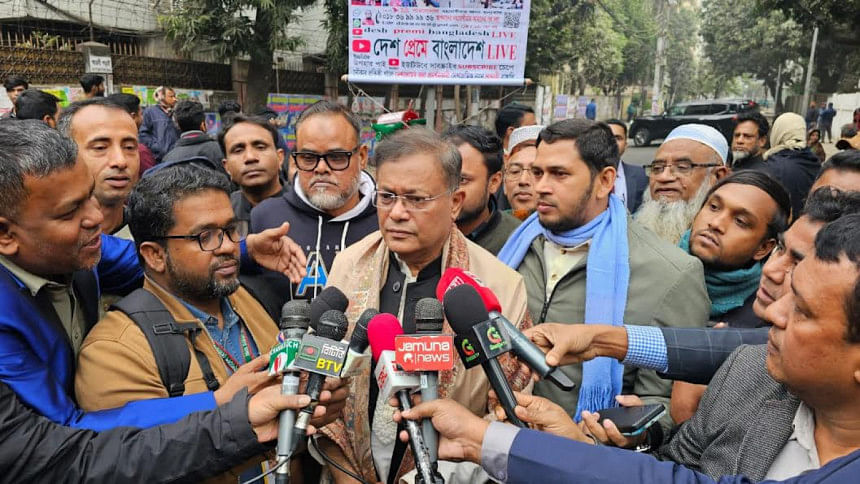Hasan Mahmud must tread lightly

Newly appointed Foreign Minister Hasan Mahmud, who faces a geopolitically complex world order, will find it hard to navigate the global powers and maintain the balancing act that Bangladesh has so far been doing well, foreign policy experts say.
There was a clear polarisation between the US-led western bloc and China, Russia and India over Bangladesh's January 7 election, which was boycotted by the opposition BNP and allies.
"This gulf between the two blocs will yawn wider," said M Humayun Kabir, former ambassador and now president of Bangladesh Enterprise Institute.
He said that China's statement, following the victory of Awami League, was clear that Beijing wants to advance the cooperation through the Belt and Road Initiative, which is a global geopolitical project of the country.
On the other hand, the US statement mentioned its geopolitical project -- the Indo-Pacific Strategy, which, analysts say, is aimed at containing Chinese influence in this region. "The US and other western countries have spoken of advancing economic cooperation but also the aspects of democracy, human rights, freedom of civil society and media," Kabir said.
Over the last several years, these issues dominated the West's conversation when it came to Bangladesh.
The government definitely needs to improve on these aspects to improve the relations with the West, Kabir said, adding that given Bangladesh's current economic challenges, the relations are even more important as the US and European Union are the country's major export markets.
"The upcoming challenge for the new regime lies in navigating this shifting dynamic."
As Bangladesh will be losing the GSP facility with the EU after 2029 because of its graduation from LDC in 2026, it is imperative that the government take all measures to ensure that the country avails itself of GSP Plus facility from the EU after 2029, he said.
"Bangladesh will have to make different trade relations with the foreign countries once the duty-free regime expires, and the foreign ministry, apart from the commerce ministry, has a pertinent role to play in the negotiations."
Prof Obaidul Haque, of the international relations department at Dhaka University, said there was much talk about the unprecedented collaboration between India and China leading up to the Bangladesh elections, given their historically confrontational interests.
"However, post-elections, it appears unlikely that they will maintain this unified stance," he told The Daily Star yesterday.
"The upcoming challenge for the new government lies in navigating these shifting dynamics. While the government has been lauded for its adept balancing act, categorising India as a strategic partner and China as merely a developmental one, potential complications arise as China seeks returns for its steadfast support during the election, such as pushing for the Teesta [river management] deal."
Haque said that as a less influential actor, Bangladesh's foreign policy is often crafted under duress.
"The developments surrounding the polls and their aftermath may exacerbate the difficulties in navigating this complex terrain.
"The rapidly evolving situation in the Myanmar civil war and the potential escalation following the Israeli aggression in Gaza further complicate the landscape of the new government's foreign relations."
Haque also said that while it seems the US policy regarding the election has faltered, the true repercussions are yet to unfold.
"In light of these uncertainties, my inclination is that our foreign policy in the coming days will be more reactive than proactive."
Humayun Kabir further said Bangladesh diplomats have a big role to play in maintaining the balance with the global powers, adding that it is crucial for the government to address the domestic political issues; improve governance, especially financial management; and improve the business climate both for domestic and foreign investors.
"As Bangladesh faces a shortage of foreign currency, migrant remittance can be significantly increased by improving migration governance."
Analysts said Hasan Mahmud, the new foreign minister, will need to bolster coordination with all the relevant ministries -- law, home, commerce, expatriates' welfare -- so that the government can work with a "whole-government approach", rather than the ministries working in an isolated manner when it comes to foreign relations.
"If we can improve our economy, much of the challenges will be addressed. We will have a strong voice," Kabir said.
Meanwhile, Foreign Minister Hasan Mahmud yesterday said he would work to further strengthen Bangladesh's relations with both the east and west.
"The prime minister entrusted me with the foreign ministry's responsibilities. We'll move the country forward and brighten its image, while improving relations with the east and the west."

 For all latest news, follow The Daily Star's Google News channel.
For all latest news, follow The Daily Star's Google News channel. 



Comments